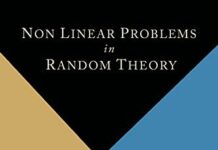
Ebook Info
- Published: 1965
- Number of pages: 212 pages
- Format: PDF
- File Size: 8.40 MB
- Authors: Norbert Wiener
Description
Acclaimed one of the “seminal books… comparable in ultimate importance to… Galileo or Malthus or Rousseau or Mill,” Cybernetics was judged by twenty-seven historians, economists, educators, and philosophers to be one of those books published during the “past four decades,” which may have a substantial impact on public thought and action in the years ahead.―Saturday Review
User’s Reviews
Editorial Reviews: Review — John B. Thurston, “The Saturday Review of Literature”” It appers impossible for anyone seriously interested in our civilization to ignore this book. It is a ‘ must’ book for those in every branch of science . . . in addition, economists, politicians, statesmen, and businessmen cannot afford to overlook cybernetics and its tremendous, even terrifying implications. ” It is a beautifully written book, lucid, direct, and despite its complexity, as readable by the layman as the trained scientist.” — John B. Thurston, “The Saturday Review of Literature”& quot; It appers impossible for anyone seriously interested in our civilization to ignore this book. It is a & lsquo; must& rsquo; book for those in every branch of science . . . in addition, economists, politicians, statesmen, and businessmen cannot afford to overlook cybernetics and its tremendous, even terrifying implications. & quot; It is a beautifully written book, lucid, direct, and despite its complexity, as readable by the layman as the trained scientist.& quot; — John B. Thurston, The Saturday Review of Literature”It appers impossible for anyone seriously interested in our civilization to ignore this book. It is a ‘must’ book for those in every branch of science . . . in addition, economists, politicians, statesmen, and businessmen cannot afford to overlook cybernetics and its tremendous, even terrifying implications.”It is a beautifully written book, lucid, direct, and despite its complexity, as readable by the layman as the trained scientist.”–John B. Thurston, “The Saturday Review of Literature” Review It appears impossible for anyone seriously interested in our civilization to ignore this book. It is a ‘must’ book for those in every branch of science…in addition, economists, politicians, statesmen, and businessmen cannot afford to overlook cybernetics and its tremendous, even terrifying implications. It is a beautifully written book, lucid, direct, and despite its complexity, as readable by the layman as the trained scientist.―John B. Thurston , The Saturday Review of Literature About the Author Norbert Wiener (1894–1964) served on the faculty in the Department of Mathematics at MIT from 1919 until his death. In 1963, he was awarded the National Medal of Science for his contributions to mathematics, engineering, and biological sciences. He was the author of many books, including Norbert Wiener―A Life in Cybernetics and the National Book Award-winning God & Golem, Inc.: A Comment on Certain Points Where Cybernetics Impinges on Religion (both published by the MIT Press). Read more
Reviews from Amazon users which were colected at the time this book was published on the website:
⭐The founder of cyber methodology and thought. A must read for anyone contemplating a career involving cyber. Cybernetics, while a tad dry, clearly shows the linkages between how communication works, and how the initial processes of communication were studied and included with the original thinkers. For even better success, pair this purchase with “Rise of the Machines” by Thomas Rid to continue examining how the field developed beyond Weiner’s initial work.
⭐This is a seminal work by Norbert Wiener,genius mathematician, who was a child prodigy who recieved his PhD from Harvard at 18, then denied a faculty postion because he was Jewish in 1936. He was a generalist, however, having first studied Zoology and philosophy; later psychology. He was absolutely prescient in his predictions about the sociopolitical outcome of Cybernetics a term that he coined himself. Cybernetics is automation, using feedback loops, that has led to robotics and machines making machines and leaving unemployment behind. Wiener predicted our current state of affairs in Cybernetics as well as in his sequel, Human Uses of Human Beings. It is a robustly readable book if one must skip the few mathematical formulas and milk it for its social implications. He discusses the coming concentration of media (communication), loss of local media, and the propagandization of our democracy leading to war. He predicts the economic failures that have seized the Western World before and since 2008 and that call for a “search for novel means of distribution of wealth” because full employment would no longer be needed or relevant. Here is a man who was at home with contemporaries Mead, Einstein, Buckminster Fuller, Bateson. For his long range views, that valued decentralization, he was ostracised and maligned by centrists and war profiteers. This book is an essential building block for the understanding of modern social and political problems and for the beginning of solutions. It is a true classic in the humanities sense.”Cybernetics typically denotes the interdisciplinary study and strategic deployment of communicative control processes in “complex systems” constituted by humans, other animals, machines, and the rest of living-nature. In what follows, I wish to suggest an even broader use of this term. Cybernetics, not simply as a field of techno-science research and application, but as a term connoting the most far-reaching of ultramodern forms of social control. In this sense, I will be using the phrase, social cybernetics, to provisionally configure the fluid, high speed, and densely layered webs of communicatively driven positive and negative “feedback” which, this very moment, affect the ways you are receiving my words. This is a story of how loops of cybernetic feedback are informing the energetic ritual organization of power between ourselves and others. Within the fast-flexible boundaries of global capital, the most dominant, but certainly not all, of these feedback loops carry a masculine, heterosexist, and racially inscribed charge. This is a history of the present.” Stephen Pfohl […] Such is the effect upon readers of Cybernetics by Norbert Wiener.
⭐This was a very interesting book. It had some idiosyncrasies that prevented me from giving it a higher rating, but other than that, the subject matter and breath were fascinating enough for me to certainly recommend it to anyone with any interest in cybernetics as a broad concept.Let me first say that there were a few chapters in the beginning and end that were needlessly technical and mathematical. It isn’t so much that I object to the existence of mathematical proofs in their proper context, but it seemed unnecessarily detailed for the overall purpose and thrust of the book. After working my way through a few of the demonstrations, I eventually gave up an took the author’s word on the soundness of his conclusions. I think this is fair enough to do, so much so, in fact, that I started to wonder why he was making me flip past pages upon pages of dense calculus only to arrive at a summary paragraph that would elucidate the meaning of his findings. At one point he attempts to justify this technique by saying something to the effect of: it would take me much longer to put these formulae into common English, so read them for their condensed shorthand value. I, as the reader, would have been perfectly willing to let him dispose of the rigor for the sake of cleaner text. But whatever; maybe people really wanted to delve into that level of demonstration.In addition, for as direct and focused Wiener seems to be as a mathematician, his thoughts, and even his prose, seem disjointed and meandering. He quickly moves from one large concept to the next, sometimes leaving the reader reeling trying to catch up. He goes on digressions that seemed opinionated and lengthy, and, when returning to the original thread, makes no real indication that he has returned. Other times these digressions will be nearly freeform transitions between concepts, similarly lacking indication that he has departed one concept and started addressing another. That he does both of these leaves the reader wondering if the text is moving forward or looping back. I would like to think that the author was making some larger point about the nature of cybernetics though this ambiguity, but this seems doubtful to me.These criticisms are small, however, taken in relation to the positive aspects of this book. The conclusions being reached by Wiener might seem banal to a contemporary reader, but this only lends credibility to their influence. Weiner not only anticipates a great deal of the future of computing, he also strongly develops a theory of the animal (and human) as, essentially, an organic computing machine; not just the brain, but the whole organism. Early in the work, he distinguishes this position from simplistic Cartesian materialism (i.e. with respect to Descartes’ conception of animals as sophisticated machines), and, instead, argues for a vitalism that explains the soul as a material concept. It is non-symmetrical feedback, as unfolding through time, that makes the system seem vital as opposed to mechanical, and it is this level of complexity that makes the behavior of animals and humans seem so radically different than the motions of planets or pendulums.The remainder of the work goes on to apply the cybernetic concept of feedback to a whole range of biological phenomena and computational questions in a way that demonstrates the power of the theory and the broadness of its application. So much of what Wiener says is taken as understood in modern times that it is easy to lose sight of how striking his claims really are.
⭐Dear old “dad” (of cybernetics) had some primitive ideas conceived when there was nothing and nobody on the planet discussing them. His ideas were the germs of work that has by now mushroomed way beyond what he intended when he unloosed the concept of cybernetic feedback.
⭐Dr. Weiner falls into a list of 20th century scientists that you’ve likely never heard of, but whose thoughts and research has impacted many aspects of your life (including the computer/mobile device you are reading this on). While written over 5 decades ago, Dr. Weiner is remarkably prescient in his writing, and demonstrates his expansive vision for the world as he saw it then, as well as were it was headed in the future.
⭐Tough read but learning a lot about cybernetic theory.
⭐Definitely worth taking the time to read.
⭐An awesome classic in systems science. Wiener’s was a genuinely brilliant mind, and it is a privilege to read these sentences. Still exciting to read, and I will come back to it again and again.
⭐Classic book.
⭐Mathématicien talentueux, Norbert Wiener a introduit la << cybernétique >> qui, si l’on suit ce livre, recouvre l’ensemble du savoir humain, ou presque. L’auteur y affiche une culture encyclopédique, souvent superficielle. Dès le début, il rapproche, voire confond les incertitudes liées à la mécanique statistique et à la sensibilité aux conditions initiales pour les équations différentielles avec le fameux principe d’incertitude de Heisenberg en physique quantique. Erreur gravissime ! Ailleurs, il passe, par exemple, de considérations sur Sigmund Freud aux équations aux dérivées partielles. Cette bouillie, épicée par de nombreux calculs mathématiques abscons, laisse sans voix. Même si l’on doit sans doute à la cybernétique la popularité dans le langage courant de la notion fondamentale de<< feedback >>, son héritage est mince aujourd’hui. Mérite-t-elle mieux ?Cet ouvrage est un classique. Bien que depuis sa première parution au lendemain de la seconde guerre mondiale, l’informatique, les automatismes et les moyens de communication aient connu un développement considérable, cet ouvrage est indispensable pour comprendre ce qu’il en est aujourd’hui de ces savoirs et techniques qui ont complètement envahi notre vie. Science et philosophie s’entremêlent étroitement et la lecture est particulièrement stimulante pour quiconque souhaite comprendre notre monde. A lire absolument le second ouvrage du même auteur : “The human use of human beings”.Rappelons qu’après la seconde guerre mondiale Norbert Wiener s’est opposé avec beaucoup de vigueur aux risques de guerre et à la militarisation de la science. A travers ces deux ouvrages, on comprend comment la science peut favoriser des valeurs humanistes de partage du savoir au service de la paix et comment en se mettant au service de la guerre elle se trahit.Gérard Chazal, professeur émérite d’histoire et philosophie des sciences – Université de Bourgogne.excellent
Keywords
Free Download Cybernetics, Second Edition: or the Control and Communication in the Animal and the Machine in PDF format
Cybernetics, Second Edition: or the Control and Communication in the Animal and the Machine PDF Free Download
Download Cybernetics, Second Edition: or the Control and Communication in the Animal and the Machine 1965 PDF Free
Cybernetics, Second Edition: or the Control and Communication in the Animal and the Machine 1965 PDF Free Download
Download Cybernetics, Second Edition: or the Control and Communication in the Animal and the Machine PDF
Free Download Ebook Cybernetics, Second Edition: or the Control and Communication in the Animal and the Machine





